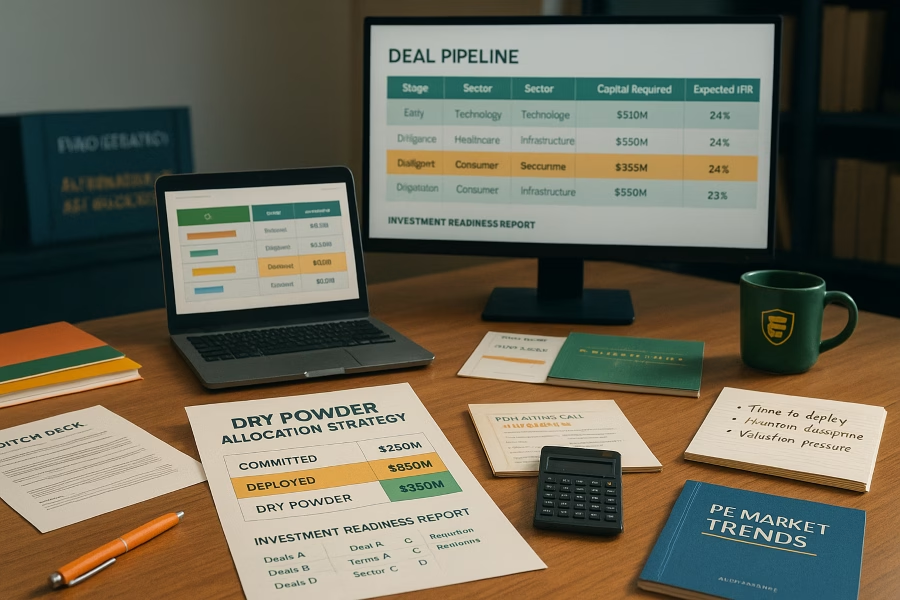Dry powder in private equity represents a critical financial concept that shapes investment strategies worldwide. This term refers to the unspent capital that private equity firms hold in reserve, ready to deploy when the right opportunities arise.
As of December 2024, global dry powder reserves surpassed $2.51 trillion, reflecting a decade-long annual growth rate of 10%. This unprecedented accumulation underscores the strategic emphasis firms place on liquidity. Investors must monitor these trends to maximize potential returns.
Private equity dry powder provides both flexibility and strategic power for investors. This blog explores the dynamics of dry powder in private equity, offering data-driven insights and actionable strategies for investors. Let’s jump right in.
What Exactly Is Dry Powder in Private Equity and Why Does It Matter?
Dry powder in private equity is unspent, committed capital kept in reserve to fund new investments when promising opportunities appear. Essentially, dry powder represents unspent capital that has already been committed by investors but remains unallocated. This reserve ensures firms can act decisively during market downturns or periods of volatility, where undervalued assets may present lucrative prospects. Beyond VC and PE, the concept extends to corporate finance and even personal financial planning, emphasizing its universal relevance across sectors.
The scale is substantial. Data from over 14,500 closed-end funds shows a combined capitalization nearing USD 12.3 trillion in committed capital. This highlights how dry powder strategies permeate the industry, ensuring liquidity and timely deployment.
Budget vs actual shows how to track variances by owner and category, then turn gaps into actions, not excuses. It includes simple thresholds for when to reforecast vs. stay the course. Drop it near your monthly review section.
How Dry Powder Has Changed Over Time
The concept of “dry powder” has evolved significantly since its origins in the 17th century. Initially, the term referred to gunpowder reserves that were carefully kept dry to ensure readiness for battle. This precaution was vital, as damp gunpowder could render weapons useless during critical moments. Over time, the phrase transitioned into the financial realm, symbolizing uninvested capital held in reserve for strategic opportunities.
This evolution has accelerated. Private equity dry powder has grown at an annual rate of 10% globally over the past decade, reaching unprecedented levels by late 2024. Annual growth trend in dry powder signals lasting industry transformation towards liquidity and readiness.
Historically, dry powder represented a form of preparedness, whether for warfare or investment. In modern finance, it underscores the importance of maintaining liquidity to seize favorable market conditions or mitigate risks during economic downturns. The evolution of this term reflects its enduring relevance, adapting from physical survival to financial strategy.
How Dry Powder in Private Equity Shapes the Venture Capital Landscape
Dry powder, a term synonymous with unallocated capital, plays a pivotal role in venture capital dynamics. In 2023, global venture capital dry powder reached an impressive $652.2 billion, with $296.2 billion attributed to the United States alone. This financial reserve empowers venture capitalists to act decisively, funding innovative startups and scaling portfolio companies without the risk of rapid capital depletion.
Maintaining dry powder is more than a safety net; it’s a strategic advantage. It enables venture capital firms to remain agile, responding to emerging opportunities in fast-paced markets. For instance, when groundbreaking technologies or disruptive business models surface, having unspent capital ensures VCs can invest promptly without waiting for additional fundraising rounds.
The importance of dry powder extends beyond initial investments. It also supports portfolio growth, allowing firms to provide follow-on funding to promising startups. This approach ensures that high-potential companies receive the resources needed to thrive in competitive industries.
Why Private Equity Keeps Dry Powder in Reserve
Private equity firms are known for maintaining significant reserves, commonly referred to as “dry powder in private equity,” to ensure liquidity and seize acquisition opportunities. In 2023, global private equity dry powder stood at $1.5 trillion, marking a decline from $1.7 trillion in 2022. This adjustment reflects broader market dynamics, including reduced fundraising and cautious investment strategies.
Market activity remains robust. Q3 2025 saw global PE investment reach $537.1 billion across 4,062 deals. This volume shows how dry powder enables continued adaptation and deal execution, even amid fundraising slowdowns.
The U.S. private equity market experienced an 11.9% drop in dry powder, as highlighted in the Q3 2024 US PE Breakdown report. This decline underscores the importance of liquidity management during periods of economic uncertainty. By keeping reserves intact, firms can adapt to fluctuating market conditions and remain prepared for high-value deals when opportunities arise.
Dry powder also helps mitigate risks associated with capital overhang (unused, accumulated capital). Firms that maintain these reserves manage financial stress better.
While the decline in dry powder may signal caution, it also highlights the strategic importance of maintaining reserves. As markets evolve, private equity firms continue to prioritize liquidity, ensuring they are well-positioned to capitalize on emerging opportunities while safeguarding their portfolios.
How Investors Make the Most of Their Unspent Capital
Unspent capital, often referred to as “dry powder in private equity,” plays a pivotal role in shaping investment strategies. By maintaining cash reserves, investors can fuel portfolio growth, address liquidity challenges, and seize special situations such as distressed-debt opportunities. This section explores actionable strategies for deploying dry powder effectively, supported by a real-world case study.
- Fueling portfolio growth
- Addressing liquidity constraints
- Capitalizing on special situations
However, excessive dry powder can result in missed returns or regulatory scrutiny if reserves aren't efficiently deployed.
Best Practices for Capital Call Timing
- Align capital calls closely with deal execution to minimize periods of idle dry powder and reduce return dilution.
- Monitor market conditions regularly to time capital calls when attractive investment opportunities are most likely to arise.
- Communicate proactively with limited partners about capital call schedules to maintain transparency and strengthen investor trust.
1. Fueling Portfolio Growth
Dry powder provides investors with the flexibility to support existing portfolio companies during critical growth phases. Whether funding expansion initiatives or scaling operations, these reserves ensure businesses can capitalize on market opportunities without delay. For example, investors often use dry powder to inject capital into high-performing companies, enabling them to outpace competitors and achieve sustainable growth.
2. Addressing Liquidity Constraints
Economic downturns and market volatility can strain liquidity for portfolio companies. Dry powder acts as a safety net, allowing investors to stabilize operations and maintain financial health during uncertain times. This approach not only mitigates risks but also positions companies for recovery when market conditions improve.
A review of how to perform scenario analysis in financial modeling illustrates thoughtful approaches to evaluating variable outcomes in dry powder strategies, ensuring preparedness for liquidity challenges.
3. Capitalizing on Special Situations
Maintaining cash reserves enables investors to act decisively in special situations, such as distressed-debt opportunities or undervalued acquisitions. These scenarios often arise during market disruptions, presenting unique chances to secure high-value assets at favorable terms. For instance, Mercer Secondaries demonstrated this approach by closing its first infrastructure GP-led secondary deal as a lead buyer.
Real-World Example: Mercer’s Strategic Acquisition
Mercer’s case highlights the benefits of deploying dry powder with precision. By leveraging data insights, Mercer identified and executed a secondary deal that strengthened its portfolio. This example underscores the importance of combining capital reserves with informed decision-making to maximize returns.
Investors who prioritize dry powder utilization can unlock significant advantages, from stabilizing portfolio companies to capitalizing on market disruptions. By integrating strategic planning and scenario analysis, they ensure their unspent capital delivers optimal results.
Risks of Aging Dry Powder
Building on these strategies, investors should recognize the risks of holding dry powder for extended periods. Prolonged unspent capital can dilute fund returns, as delayed deployment may miss optimal market windows. This situation can also erode limited partner confidence, making future fundraising more challenging. Effective capital management requires balancing readiness with timely investment to sustain performance and trust.
How Corporations Use Dry Powder for Strategic Reserves
Corporations often prioritize maintaining dry powder, unspent capital reserves, to ensure they can meet working capital needs and sustain daily operations. This financial strategy becomes particularly vital during economic downturns, when liquidity challenges can threaten operational continuity. By holding sufficient reserves, businesses can adapt to volatile market conditions without compromising their core functions.
Strategic reserves also provide flexibility for corporations to address unexpected expenses or seize growth opportunities when competitors may struggle. For instance, during periods of economic uncertainty, dry powder can be allocated to stabilize supply chains, support payroll, or invest in essential resources. This proactive approach helps businesses safeguard their operations while positioning themselves for long-term success.
Corporate reserves fuel acquisition activity. In 2025, U.S. M&A deal volume is projected at $2.3 trillion, up 49% from 2024. This surge demonstrates how strategic dry powder positions corporations to capitalize on expansion opportunities during market upswings.
To enhance forecasting and allocation of dry powder, companies increasingly rely on AI financial modeling tools. These advanced systems streamline projections and optimize capital management, ensuring reserves are effectively utilized.
What Dry Powder Means for Your Personal Finances
Wider market trends highlight liquidity's importance. Between 2023 and 2026, the great wealth transfer is expected to move $1 trillion across generations. This shift underscores why maintaining personal dry powder can be essential for major transitions and opportunities.
Keeping a portion of your finances in liquid assets, often referred to as “dry powder,” can be a game-changer for personal financial security. This concept emphasizes the importance of maintaining unspent capital to address unexpected emergencies or future obligations.
Liquid assets, such as cash or easily accessible savings, act as a financial cushion during uncertain times. Whether it's an unforeseen medical expense or a sudden job loss, having dry powder ensures you're prepared to handle challenges without resorting to high-interest debt. Beyond emergencies, this financial strategy also positions you to seize opportunities, such as investing in a promising venture or purchasing assets at favorable prices.
Effective personal finance management involves balancing your spending and saving habits to ensure you always have accessible funds. By prioritizing liquidity, you create a safety net that not only protects you from financial stress but also empowers you to make thoughtful investment decisions when opportunities arise.
Conclusion
Effective management of dry powder in private equity is essential for firms aiming to maximize their investment potential. By prioritizing data-driven insights, firms can make informed decisions that align with market opportunities and long-term goals. This approach not only enhances capital deployment strategies but also ensures that unspent funds are utilized strategically to drive growth and profitability.
At Qubit Capital, we understand the importance of transforming idle private equity capital into impactful investments. If you're ready to turn your dry powder into strategic acquisitions, we invite you to explore our Strategic Acquisition service. Let us help you unlock the full potential of your capital with tailored solutions designed for success.
Key Takeaways
- Dry powder refers to unspent capital reserved by PE and VC firms
- It ensures liquidity and flexibility to act on investment opportunities
- Historical trends show dry powder levels vary with market conditions
- Investors use dry powder for growth, liquidity management, and distressed assets
- Entrepreneurs and corporates can utilize dry powder data for smarter financial planning
Frequently asked Questions
What does dry powder mean in private equity?
Dry powder in private equity means committed, unallocated capital reserved for future investments. It enables firms to act fast on opportunities in the market.






